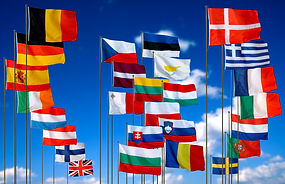
The European Union can rise to a leader position in international relations
14 octobre 2014
With the weakening of the world leadership of the USA and the rise of rival powers such as the BRICS, balance of powers is shifting. But besides these two major actors, another one can play a role: the European Union. Knowing that the most recent European Union’s objectives and law enable to achieve such a goal, let’s see that thanks to its economy and its developing model the European Union can become a leading actor on the international stage.
The way the European Union sees the world is an asset for it. Drawing lessons from two destroying wars, the EU sees into inter-countries cooperation and integration the key ways to achieve peace, security and prosperity. This particularity has led certain academics to point the Union as the first “post-modern” actor in the world, whose model could be relevant for the future. Besides, the fact that the Union recognizes itself certain values, goals and norms, also strengthens it. The respect of democracy, human rights and international law are all engraved in the 1992 constitutional Maastricht Treaty. To be a major actor, the presence of such goals is essential to get unity and coherence in the long run for the conduct of international relations.
But if we want to question the possibility for the EU to get a greater role on the international stage, analyzing the 1986 Single European Act is a starting point. The extract which calls the Community to “display the principles of democracy and compliance with the rule of law and with human rights” highlights the possibility for the EU to act internationally according to these goals. Seven years later, the Maastricht Treaty recalls the importance of democracy, peace, security, minority and human rights internationally. More notably, the 2003 European Security Strategy (ESS) is also significant and important regarding the role of the EU. As it calls to create an “international order based on effective multilateralism which entails upholding international law and strengthening the UN”, we notice that the EU has its own approach of international cooperation and relations. Different from the one of the United States, the future role of the EU does not lie into dominating the international relations but promoting and organizing cooperation, along with other actors such as the UN and complying with the international law. Against that background, the neo-functionalist approach is relevant. Developed in the context of European integration, this theory asserts that European institutions (such as the Commission) may push for EU foreign actions thanks to its judicial tools and by articulating together European countries interests.
But the real power of the European Union is undoubtedly its economy. World leader by its production, the European Union is also often at the cutting edge of modernity in the fields of research and technology, and has the world’s two largest monetary unions. As a result, the EU is a major actor in world trade. Its participation to world trade created significant ramifications between its members and, above all, with the rest of the world. Therefore, cooperation is promoted and forums of discussion have become compulsory. Economic tools have been privileged above military ones. More efficient and less expensive, this prioritization also contributes to the fact that the EU is a post-modern actor (as discussed above). The success of the embargo against South Africa in the 1990s proves the efficiency of economic tools and trade diplomacy.
Only in the economical field, the EU succeeded in speaking one voice. In the World Trade Organization, where the EU has one common seat for all its members, the EU gets greater weight and therefore has risen to a leading role in trade regulation, such as in fishery of biodiversity. This economic prominence led John McCormick to point the EU as a “superpower” in his famous book The European Superpower. Indeed, economic power can spill over into a political one. For instance, the aid dedicated to development provided by the European Union (at the level of 60% of total world donations according to the Cox & Koning 1997 investigation) can be used to pursue foreign policy objectives, such as humanitarian development or global security. The interdependence established by the economic ties can create opportunities and foster collective actions. Furthermore, collective actions are considered as more legitimate on certain issues as they are the result of many actors’ will. That’s notably the case in the human rights’ field: the European Union can only be efficient in its defense if it speak one voice.
But the European Union, as it still suffers from its divisions, needs to create more common policies in order to create more common interests. Common policies are indeed the only way to gather all countries in Europe, conferring a real unity to the Union.
The European Union has clearly the potential to become a major actor of international relations. With clear and proper goals and values, the European Union can act internationally: its law enables it. But to become such an actor, the economy appears to be the best strength of the European Union. It can help it to get a unity in its inside and a unity to act in the outside. But, as a post-modern actor whose foreign policy conduct is based on the respect of international law and the United Nations, what’s must be well-remembered is the fact that the future of the European Union does not seem to become the most powerful leader and a “world’s police” as the United States have been, but more an important actor whose role would be to organize and promote cooperation and multilateralism.
Article également publié par Stras'diplomatie.
Gael JEANSON
University of Adelaide, South Australia
